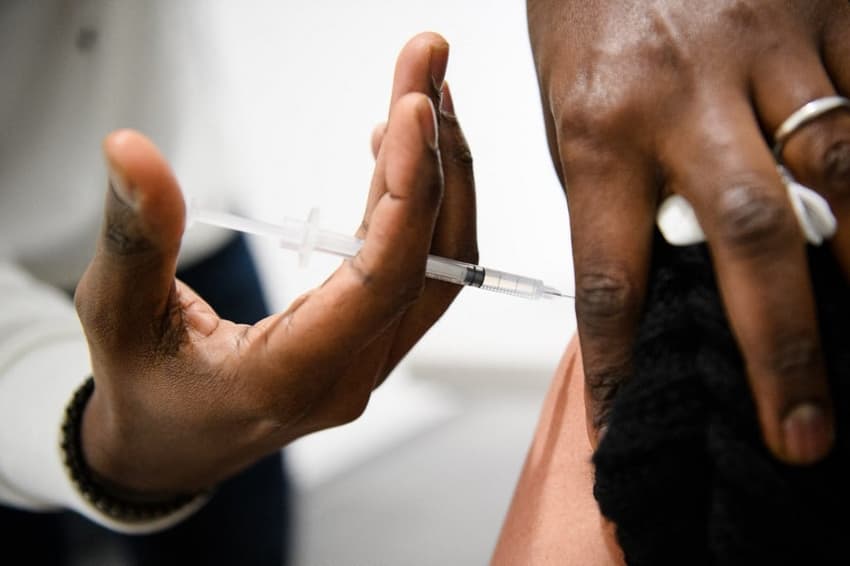French health authority recommends autumn Covid vaccine campaign

France's health regulator has called for an autumn Covid-19 vaccination campaign for at-risk groups, putting the Covid vaccine on a similar footing the the flu shot, which is administered annually to certain groups.
France's health authority, the Haute autorité de Santé (HAS) released its recommendations for 2023, and advised an autumn vaccination campaign against Covid-19 for persons at-risk of developing a severe form of the disease.
It recommends that an autumn Covid vaccine campaign be run alongside the seasonal flu vaccine drives, targeting people at risk from Covid - over 65s, people with long-term illnesses or conditions and pregnant women.
The recommendation is that the most vulnerable individuals - including immunocompromised people, those aged over 80 years old, and those at very high risk of contracting Covid-19 - could be offered another booster in the spring depending "on the state of their health and their level of vaccine protection".
French health authorities also clarified that there should be at least six months between doses, and that it will be the bivalent mRNA vaccines (ex Pfizer and Moderna) which will be prioritised.
The HAS can only issue recommendations, any final decision is up to the government.
Nevertheless, immunologist, Stéphane Paul, told Le Parisien: "I think that we will go for an annual vaccination for at-risk populations", an idea that has already been recommended in other parts of the world, including in England.
Current Covid-19 recommendations in France
As of February 1st, France relaxed some of its Covid-19 rules, as it brought an end to compulsory isolation for those who test positive for the virus.
On February 15th, the country also dropped the requirement that those travelling from China to France present a negative test taken 48 hours before the flight to board the plane.
READ MORE: What Covid rules and recommendations remain for visiting France?
This means that, as of February 2023, there are no Covid-related restrictions on arrivals into France from any country.
Masks remain 'strongly recommended' on public transport but are not compulsory anywhere in the country, with the exception of certain healthcare settings.
Comments
See Also
France's health authority, the Haute autorité de Santé (HAS) released its recommendations for 2023, and advised an autumn vaccination campaign against Covid-19 for persons at-risk of developing a severe form of the disease.
It recommends that an autumn Covid vaccine campaign be run alongside the seasonal flu vaccine drives, targeting people at risk from Covid - over 65s, people with long-term illnesses or conditions and pregnant women.
The recommendation is that the most vulnerable individuals - including immunocompromised people, those aged over 80 years old, and those at very high risk of contracting Covid-19 - could be offered another booster in the spring depending "on the state of their health and their level of vaccine protection".
French health authorities also clarified that there should be at least six months between doses, and that it will be the bivalent mRNA vaccines (ex Pfizer and Moderna) which will be prioritised.
The HAS can only issue recommendations, any final decision is up to the government.
Nevertheless, immunologist, Stéphane Paul, told Le Parisien: "I think that we will go for an annual vaccination for at-risk populations", an idea that has already been recommended in other parts of the world, including in England.
Current Covid-19 recommendations in France
As of February 1st, France relaxed some of its Covid-19 rules, as it brought an end to compulsory isolation for those who test positive for the virus.
On February 15th, the country also dropped the requirement that those travelling from China to France present a negative test taken 48 hours before the flight to board the plane.
READ MORE: What Covid rules and recommendations remain for visiting France?
This means that, as of February 2023, there are no Covid-related restrictions on arrivals into France from any country.
Masks remain 'strongly recommended' on public transport but are not compulsory anywhere in the country, with the exception of certain healthcare settings.
Join the conversation in our comments section below. Share your own views and experience and if you have a question or suggestion for our journalists then email us at [email protected].
Please keep comments civil, constructive and on topic – and make sure to read our terms of use before getting involved.
Please log in here to leave a comment.